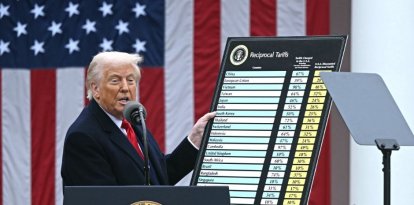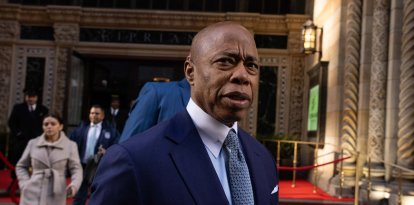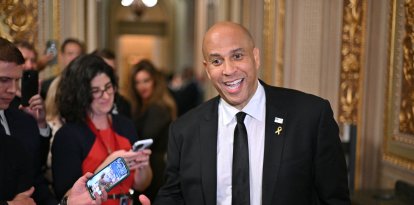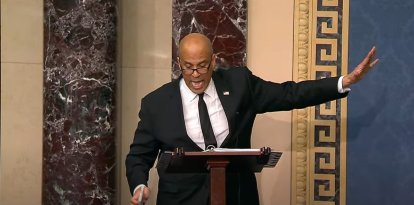The Supreme Court and birth control pills: everything you need to know about the first major abortion case since Dobbs
This time, the White House and the Food and Drug Administration (FDA) are taking on the 'Alliance for Hippocratic Medicine' over mifepristone.
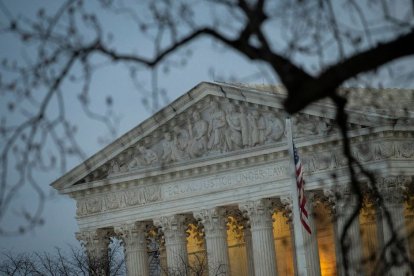
Cordon Press
On Tuesday, the Supreme Court (SCOTUS) heard oral arguments in the first major abortion case since Dobbs v. Jackson Women's Health Organization, which returned to the states the power to rule on this issue. This time, the White House and the Food and Drug Administration (FDA) confront the 'Alliance for Hippocratic Medicine' over abortion pills.
Since the aforementioned decision that reversed Roe v. Wade and Planned Parenthood v. Casey in 2022, abortion has become illegal in 14 states, and 11 others have drawn limits on the practice, but abortion pills remain widely available across the country.
The nine judges that make up the country's highest court participated in a session of approximately 90 minutes in which they listened to the lawyers of both parties and their respective arguments. The final decision is expected to be published in June.
What is the case about?
The drug at the center of this case is mifepristone, a drug used in abortion pills, which was approved by the FDA in 2000 and has been rated by the agency as safe and effective. In 2016, these abortion pills became more accessible because they were allowed to be delivered by mail, dispensed in pharmacies, and ordered online.
A group of anti-abortion doctors joined together in a lawsuit called the 'Alliance for Hippocratic Medicine,' alleging that the drug is unsafe and that the FDA did not study it enough to approve it.
Specifically, they are seeking the country's highest court to reverse the aforementioned actions of the FDA and make the pills less accessible.
Erin Hawley represents the group of doctors, while Elizabeth Prelogar represents the DEA and the Department of Justice. In turn, Jessica Ellsworth serves as the attorney for Danco Laboratories, manufacturer of mifepristone.
The Court would seem to lean in favor of the DEA
Oral arguments are often a window into the justices' thinking about the case since the line of their questions offers almost a preview of what to expect when the nine members vote behind closed doors. On this occasion, liberals and some conservatives were more skeptical of the 'Alliance for Hippocratic Medicine' argument.
For example, in the latter group, Amy Coney Barrett and Neil Gorsuch expressed doubts about doctors' arguments about the harms of abortion pills and whether restricting their access would address these harms.
Gorsuch also questioned the impact of a decision in favor of the doctors' group, which is seeking a nationwide rollback of pill distribution policies.
"This case seems like a prime example of turning what could be a small lawsuit into a nationwide legislative assembly on an FDA rule or any other government actions. Why can’t the court specify that this relief runs to precisely the parties before the court as opposed to looking to the agency in general and saying, ‘Agency, you can’t do this anywhere’?” he said.
“Do you think that courts have specialized scientific knowledge with respect to pharmaceuticals?”
According to the position of the DEA, the Federal Government and Danco Laboratories, the decision to relax the restrictions on the drug was based on agency experience and scientific data, which should not be annulled by a court or be open to challenges from third parties, without reliable evidence that it causes the damage that the group of doctors argues.
Ketanji Brown Jackson, the newest addition to the Supreme Court, agreed with this reasoning and asked everyone in the room: “Do you think that courts have specialized scientific knowledge with respect to pharmaceuticals? Do you have concerns about judges parsing medical and scientific studies?”
On the other side of the room, Hawley insisted that the lawsuit was not asking the judges to play the part of the DEA but rather to listen to the arguments and reasoning against making the distribution of abortion pills more flexible. "We’re not asking that the court second-guess the agency’s determinations at all," said the lawyer.
Justice Samuel Alito, author of the majority decision in Dobbs, expressed concern that mailing the pills may be linked to increased emergency room visits. In turn, he questioned Prelogar about whether the federal government had suggested that the FDA could not be sued.
“So your argument is that it doesn’t matter if the FDA flagrantly violated the law and didn’t do what it should have done, endangering the health of women? It’s just too bad — nobody can sue in court," he said.
In this regard, Judge Sonia Sotomayor said that determining the limit to a drug based on its alleged complications "is a very difficult question," to which Prelogar recalled that " that is a question that Congress has entrusted to the FDA."
The implications of the case
According to POLITICO, "a decision that sides with the Biden administration — likely to come in June — would be a major victory for the FDA’s authority to regulate prescription drugs and for abortion-rights advocates who have sought to protect access to mifepristone, the drug used in roughly two-thirds of abortions in the U.S."
As for the scope of the ruling, both Gorsuch and John Roberts suggested tailoring it to apply only to the plaintiffs and not to the entire country.
Politically speaking, the decision could impact younger voters' enthusiasm to back pro-abortion candidates, as happened in the 2022 midterm elections, when the Court's ruling energized that base across the country.
RECOMMENDATION

